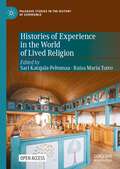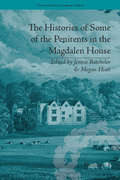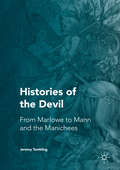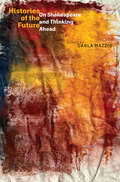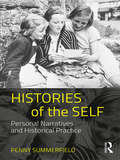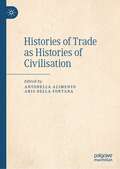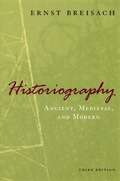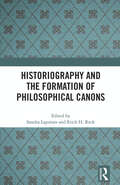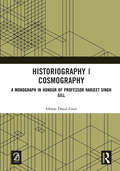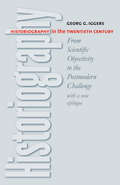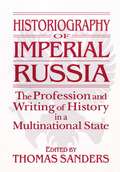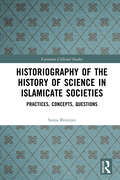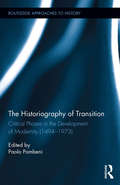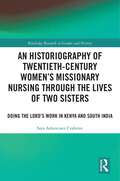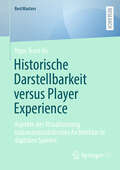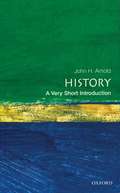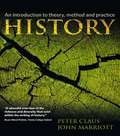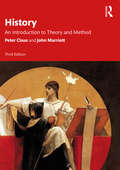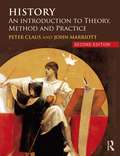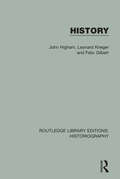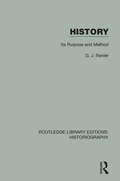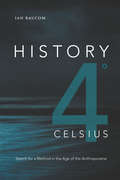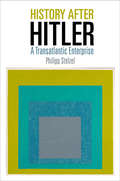- Table View
- List View
Histories of Experience in the World of Lived Religion (Palgrave Studies in the History of Experience)
by Raisa Maria Toivo Sari Katajala-Peltomaa'At a historic moment, when religion shows all its social and political strength in various post-modern societies around our globe, this fascinating collection of studies from the Middle Ages to twentieth-century Europe demonstrates all the richness and innovative force of investigating individual and shared experiences when questioning the cultural, political and social place of religion in society. It also makes known in English the work of a series of Finnish historians elaborating together a pioneering vision of the notion of experience in the discipline of history.'- Piroska Nagy, Université du Québec à Montréal, Canada This open access book offers a theoretical introduction to the history of experience on three conceptual levels: everyday experience, experience as process, and experience as structure. Chapters apply 'experience' to empirical case studies, exploring how people have made and shared their religion through experience in history. This book understands experience as a simultaneously socially constructed and intimately personal process that connects individuals to communities and past to future, thereby forming structures that create and direct societies. It represents the crossroads of a new field of the history of experience, and an established tradition of the history of lived religion. Chapters offer a longue durée view from the fourteenth-century heretics, via experiences of miracle, madness, sickness, suffering, prayer, conversion and death, to the religious artisanship of soldiers in the Second World War frontlines. It concentrates on Northern Europe, but includes materials from Italy, France and United Kingdom.
The Histories of Some of the Penitents in the Magdalen House (Chawton House Library: Women's Novels)
by Jennie Batchelor Megan HiattFirst published in 1759, this novel aims to promote the cause of the Magdalen House, a charity which sought to rehabilitate prostitutes by fitting them for a life of virtuous industry. It challenges long-standing prejudices against prostitutes by presenting them as victims of inadequate education, male libertinism and sexual double standards.
Histories of the Devil
by Jeremy TamblingThis book is about representations of the devil in English and European literature. Tracing the fascination in literature, philosophy, and theology with the irreducible presence of what may be called evil, or comedy, or the carnivalesque, this book surveys the parts played by the devil in the texts derived from the Faustus legend, looks at Marlowe and Shakespeare, Rabelais, Milton, Blake, Hoffmann, Baudelaire, Goethe, Dostoevsky, Bulgakov, and Mann, historically, speculatively, and from the standpoint of critical theory. It asks: Is there a single meaning to be assigned to the idea of the diabolical? What value lies in thinking diabolically? Is it still the definition of a good poet to be of the devil's party, as Blake argued?
Histories of the Future: On Shakespeare and Thinking Ahead
by Carla MazzioWhat early modern and Shakespeare studies have to offer contemporary thinking about the futureWhat do early modern and Shakespeare studies have to offer contemporary thinking about the future? Joining a series of urgent conversations about “the future” as an object of analysis and theorization in early modern history, art history, literature, science, theology, and law, Histories of the Future addresses this question directly. This volume brings together essays that draw on early modern modes of “thinking ahead” to reconsider the ways in which the teaching and reading of Shakespeare help shape how one imagines the future from the vantage point of today.By stressing the importance of understanding how future-oriented thinking in the past informs perceptions of possibility in the present—with special attention to contemporary issues of climate change, economic inequality, race and indigeneity, queer lives, physical and mental health crises, academic precarity, conditions of scholarly labor, and the ongoing disastrous effects of settler colonialism—Histories of the Future contributes to a rich and expanding field of scholarship on temporality in pre- and early modern literatures and cultures. In the process, it also engages with key insights of twenty-first-century critical and cultural theory in reexamining historical issues ranging from the imagined inevitability of progress or apocalypse to fraught conditions of succession, chronology, catastrophe, influence, prophecy, and risk.With essays by J. K. Barret, Urvashi Chakravarty, Drew Daniel, John Garrison, Margreta de Grazia, Jean E. Howard, Jeffrey Masten, Marissa Nicosia, Vimala Pasupathi, Kathryn Vomero Santos, and Scott Manning Stevens, Histories of the Future explores the possibilities and limits of early modern futures for “thinking ahead” today.
Histories of the Self: Personal Narratives and Historical Practice
by Penny SummerfieldHistories of the Self interrogates historians’ work with personal narratives. It introduces students and researchers to scholarly approaches to diaries, letters, oral history and memoirs as sources that give access to intimate aspects of the past. Historians are interested as never before in how people thought and felt about their lives. This turn to the personal has focused attention on the capacity of subjective records to illuminate both individual experiences and the wider world within which narrators lived. However, sources such as letters, diaries, memoirs and oral history have been the subject of intense debate over the last forty years, concerning both their value and the uses to which they can be put. This book traces the engagement of historians of the personal with notions of historical reliability, and with the issue of representativeness, and it explores the ways in which they have overcome the scepticism of earlier practitioners. It celebrates their adventures with the meanings of the past buried in personal narratives and applauds their transformation of historical practice. Supported by case studies from across the globe and spanning the fifteenth to twenty-first centuries, Histories of the Self is essential reading for students and researchers interested in the ways personal testimony has been and can be used by historians.
Histories of Trade as Histories of Civilisation
by Antonella Alimento Aris Della FontanaThis edited collection explores the histories of trade, a peculiar literary genre that emerged in the context of the historiographical and cultural changes promoted by the histoire philosophique movement. It marked a discontinuity with erudition and antiquarianism, and interacted critically with universal history. By comparing and linking the histories of individual peoples within a common historical process, this genre enriched the reflection on civilisation that emerged during the long eighteenth century. Those who looked to the past wanted to understand the political constitutions and manners most appropriate to commerce, and grasp the recurring mechanisms underlying economic development. In this sense, histories of trade constituted a declination of eighteenth-century political economy, and thus became an invaluable analytical and practical tool for a galaxy of academic scholars, journalists, lawyers, administrators, diplomats and government ministers whose ambition was to reform the political, social and economic structure of their nations. Moreover, thanks to these investigations, a lucid awareness of historical temporality and, more particularly, the irrepressible precariousness of economic hegemonies, developed. However, as a field of tension in which multiple and even divergent intellectual sensibilities met, this literary genre also found space for critical assessments that focused on the ambivalence and dangers of commercial civilisation. Examining the complex relationship between the production of wealth and civilisation, this book provides unique insights for scholars of political economy, intellectual history and economic history.
Historiographic Reasoning (Elements in Historical Theory and Practice)
by Aviezer TuckerHistoriographic reasoning from evidentiary inputs is sui generis. Historiography is neither empirical, nor self-knowledge, nor a genre of fiction or ideology. Historiographic reasoning is irreducible to general scientific or social science reasoning. The book applies Bayesian insights to explicate historiographic reasoning as probable. It distinguishes epistemic transmission of knowledge from evidence from the generation of detailed historiographic knowledge from multiple coherent and independent evidentiary inputs in three modular stages. A history of historiographic reasoning since the late 18th century demonstrates that there was a historiographic scientific revolution across the historical sciences in the late 18th and early 19th centuries. The underdetermination of historiography by the evidence, counterfactual historiographic reasoning, and false reasoning and other fallacies are further explained and discussed in terms of the probabilistic relations between the evidence and historiography.
Historiography: Ancient, Medieval, and Modern
by Ernst BreisachIn this pioneering work, Ernst Breisach presents an effective, well-organized, and concise account of the development of historiography in Western culture. Neither a handbook nor an encyclopedia, this up-to-date third edition narrates and interprets the development of historiography from its origins in Greek poetry to the present, with compelling sections on postmodernism, deconstructionism, African-American history, women’s history, microhistory, the Historikerstreit, cultural history, and more. The definitive look at the writing of history by a historian, Historiography provides key insights into some of the most important issues, debates and innovations in modern historiography. Praise for the first edition: “Breisach’s comprehensive coverage of the subject and his clear presentation of the issues and the complexity of an evolving discipline easily make his work the best of its kind.”—Lester D. Stephens, American Historical Review
Historiography and the Formation of Philosophical Canons
by Sandra Lapointe Erich H. ReckThis book presents a series of case studies and reflections on the historiographical assumptions, methods and approaches that shape the way in which philosophers construct their own past. The chapters in the volume advance discussion of the methods of historians of philosophy, while at the same time illustrating the various ways in which philosophical canons come into existence, debunking the myth of analytical philosophy’s ahistoricism and providing a deeper understanding of the roles historiographical devices play in philosophical thought. More importantly, the contributors attempt to understand history of philosophy in connection with other historical and historiographical approaches: contributors engage classical history of science, sociology of knowledge, history of psychology and historiography, in dialogue with historiographical practices in philosophy more narrowly construed. Additionally, select chapters adopt a more diverse perspective, by making place for non-Western approaches and for efforts to construe new philosophical narratives that do justice to the voice of women across the centuries. Historiography and the Formation of Philosophical Canons will be of interest to researchers and advanced students working in history of philosophy, meta-philosophy, philosophy of history, historiography, intellectual history and sociology of knowledge.
Historiography | Cosmography: A Monograph in Honour of Professor Harjeet Singh Gill
by Ishwar Dayal GaurThis book attempts to study Panjab historiography from the viewpoint of cosmography, the concept derived from the cosmological paradigm which Professor Harjeet Singh Gill, an eminent semiotician, developed in his oeuvre. Since its introduction in the colonial Panjab, the discipline of historiography subdued the indigenous craft of history writing such as katha, qissa, janamsakhi, and jangnama wherein what Professor Gill has conceptualized as “the dialectic of representation and transcendence” remained ever active. This title has been co-published with Aakar Books. Print editions not for sale in South Asia (India, Sri Lanka, Nepal, Bangladesh, Pakistan and Bhutan)
Historiography in the Twentieth Century: From Scientific Objectivity to the Postmodern Challenge
by Georg G. Iggers&“No one looking for a well-informed introduction to . . the key views of history adopted by professional historians . . could find a better one than this.&” ―Richard J. Evans, author of In Defence of History A broad perspective on historical thought and writing, with a new epilogue. In this book, now published in ten languages, a preeminent intellectual historian examines the profound changes in ideas about the nature of history and historiography. Georg G. Iggers traces the basic assumptions upon which historical research and writing have been based, and describes how the newly emerging social sciences transformed historiography following World War II. The discipline&’s greatest challenge may have come in the last two decades, when postmodern ideas forced a reevaluation of the relationship of historians to their subject and questioned the very possibility of objective history. Iggers sees the contemporary discipline as a hybrid, moving away from a classical, macrohistorical approach toward microhistory, cultural history, and the history of everyday life. The new epilogue, by the author, examines the movement away from postmodernism towards new social science approaches that give greater attention to cultural factors and to the problems of globalization. &“The book has all the virtues one associates with Georg Iggers—lucidity, detachment, balance, and the ability to reveal the relation between trends in historical writing and their political and cultural contexts.&” —Peter Burke, Cambridge University
Historiography of Imperial Russia: The Profession and Writing of History in a Multinational State
by Thomas SandersThis collection of the best new and recent work on historical consciousness and practice in late Imperial Russia assembles the building blocks for a fundamental reconceptualization of Russian history and history writing.
Historiography of the History of Science in Islamicate Societies: Practices, Concepts, Questions (Variorum Collected Studies)
by Sonja BrentjesThis book presents eight papers about important historiographical issues as debated in the history of science in Islamicate societies, the history of science and philosophy of medieval Latin Europe and the history of mathematics as an academic discipline. Six papers deal with themes about the sciences in Islamicate societies from the ninth to the seventeenth centuries, among them novelty, context and decline. Two other papers discuss the historiographical practices of historians of mathematics and other disciplines in the nineteenth and twentieth centuries. The central argument of the collected papers is that in addition and beyond the study of scientific texts and instruments historians of science in Islamicate societies need to pay attention to cultural, material and social aspects that shaped the scientific activities of the authors and makers of such texts and instruments. It is pointed out that the diachronic, de-contextualized comparison between methods and results of scholars from different centuries, regions and cultures often leads to serious distortions of the historical record and is responsible for the long-term neglect of scholarly activities after the so-called "Golden Age". The book will appeal in particular to teachers of history of science in Islamicate societies, to graduate students interested in issues of methodology and to historians of science grappling with the unresolved problems of how think and write about the sciences in concrete societies of the past instead of subsuming all extant texts, instruments, maps and other objects related to the sciences under macro-level concepts like Islam or Latin Europe. (CS 1114).
A Historiography of the Modern Social Sciences
by Roger E. Backhouse Philippe FontaineA Historiography of the Modern Social Sciences includes essays on the ways in which the histories of psychology, anthropology, sociology, economics, history and political science have been written since the Second World War. Bringing together chapters written by the leading historians of each discipline, the book establishes significant parallels and contrasts and makes the case for a comparative interdisciplinary historiography. This comparative approach helps explain historiographical developments on the basis of factors specific to individual disciplines and the social, political, and intellectual developments that go beyond individual disciplines. All historians, including historians of the different social sciences, encounter literatures with which they are not familiar. This book will provide a broader understanding of the different ways in which the history of the social sciences, and by extension intellectual history, is written.
The Historiography of Transition: Critical Phases in the Development of Modernity (1494-1973) (Routledge Approaches to History)
by Paolo PombeniDefining a “historic transition” means understanding how the complex system of intellectual, social, and material structures formed that determined the transition from a certain “universe” to a “new universe,” where the old explanations were radically rethought. In this book, a group of historians with specializations ranging from the sixteenth to the twentieth centuries and across political, religious, and social fields, attempt a reinterpretation of “modernity” as the new “Axial Age.”
An Historiography of Twentieth-Century Women’s Missionary Nursing Through the Lives of Two Sisters: Doing the Lord’s Work in Kenya and South India (Routledge Research in Gender and History #54)
by Sara Ashencaen CrabtreeThis volume draws on a trove of unpublished original material from the pre-1940s to the present to offer a unique historiographic study of twentieth-century Methodist missionary work and women’s active expression of faith, practised at the critical confluence of historical and global changes. The study focuses on two English Methodist missionary nursing Sisters and siblings, Audrey and Muriel Chalkely, whose words and experiences are captured in detail, foregrounding tumultuous socio-political changes of the end of Empire and post-Independence in twentieth century Kenya and South India. The work presents a timely revision to prevailing postcolonial critiques in placing the fundamental importance of human relationships centre stage. Offering a detailed (auto)biographical and reflective narrative, this ‘herstory’ pivots on three main thematic strands relating to people, place and passion, where socio-cultural details are vividly explored. The book will appeal to a wide range of readers, both the interested public and the academic alike, where a lively, entertaining, literary style introduces readers to the politics of women’s lives, and principle and professional service foreground ethno-class-caste oppression, emancipation, conflict, commitments and religious tensions. It reveals the human, vulnerable qualities of these women, illuminating their stories and courageous choices.
Historische Darstellbarkeit versus Player Experience: Aspekte der Visualisierung nationalsozialistischer Architektur in digitalen Spielen (BestMasters)
by Ngoc Tram VuUnterhaltungsspiele, die im Zusammenhang mit der Handlung und Folge des Zweiten Weltkriegs stehen sowie eine zeitgenössische Aufarbeitung der Verbrechen des Nationalsozialismus veranschaulichen, nutzen häufig narrative und emotionale Elemente zur historischen Inszenierung. Die Darstellung und Rekonstruktion nationalsozialistischer Architektur wurde jedoch in der Forschung zu digitalen Spielen bislang kaum beachtet. Mit diesem Hintergrund untersucht diese Arbeit die visuelle Adaption der NS-Architektur in Gaming-Medien aus unterschiedlichen Jahrzehnten. Die Architektur in digitalen Spielen bildet eine hybride Form, die Fragmente historischer Bauten mit fiktionalen, oft „deutsch-faschistisch“ wahrgenommenen Formen kombiniert. Bestimmte visuelle Anpassungen werden zudem aus Spielmechanik- und Spielerfahrungsgründen neu gestaltet. Die große Diskrepanz zwischen historischen Vorbildern und fiktionalen Interpretationen schafft ein eigenes Genre der Bildsprache, das neue Forschungsansätze für die Architekturgeschichte bietet, aber auch Bedenken bezüglich der möglichen Verharmlosung der NS-Geschichte im heutigen digitalen Zeitalter weckt.
History: A Very Short Introduction
by John H. ArnoldStarting with an examination of how historians work, this "Very Short Introduction" aims to explore history in a general, pithy, and accessible manner, rather than to delve into specific periods.
History: An Introduction to Theory, Method and Practice
by Peter Claus John MarriottWhy should history students care about theory? What relevance does it have to the "proper" role of the historian? Historiography and historical theory are often perceived as complex subjects, which many history students find frustrating and difficult. Philosophical approaches, postmodernism, anthropology, feminism or Marxism can seem arcane and abstract and students often struggle to apply these ideas in practice. Starting from the premise that historical theory and historiography are fascinating and exciting topics to study, Claus and Marriott guide the student through the various historical theories and approaches in a balanced, comprehensive and engaging way. Packed with intriguing anecdotes from all periods of history and supported by primary extracts from original historical writings, History: An Introduction to Theory, Method and Practice is the student-friendly text which demystifies the subject with clarity and verve. Key features - Written in a clear and witty way. Presents a balanced view of the subject, rather than the polemical view of one historian. Comprehensive - covers the whole range of topics taught on historiography and historical theory courses in suitable depth. Full of examples from different historical approaches - from social, cultural and political history to gender, economic and world history Covers a wide chronological breadth of examples from the ancient and medieval worlds to the twentieth century. Shows how students can engage with the theories covered in each chapter and apply them to their own studies via the "In Practice" feature at the end of each chapter. Includes "Discussion Documents" - numerous extracts from the primary historiographical texts for students to read and reflect upon.
History: An Introduction to Theory and Method
by Peter Claus John MarriottThis book provides an accessible introduction to a wide range of concerns that have preoccupied historians over time. Global in scope, it explores historical perspectives not only from historiography itself but from related areas such as literature, sociology, geography and anthropology which have entered into productive dialogues with history. Clearly written and accessible, this third edition is fully revised with an updated structure and new areas of historical enquiry and themes added, including the history of emotions, video history and global pandemics. In all of this, the authors have attempted to think beyond the boundaries of the West and consider varied approaches to history. They do so by engaging with theoretical perspectives and methodologies that have provided the foundation for good historical practice. The authors analyse how historians can improve their skills by learning about the discipline of historiography, that is, how historians go about the task of exploring the past and determining where the line separating history from other disciplines, such as sociology or geography, runs. History: An Introduction to Theory and Method 3ed is an essential resource for students of historical theory and method working at both an introductory and more advanced level.
History: An Introduction to Theory, Method and Practice
by Peter Claus John MarriottDemystifying the subject with clarity and verve, History: An Introduction to Theory, Method and Practice familiarizes the reader with the varied spectrum of historical approaches in a balanced, comprehensive and engaging manner. Global in scope, and covering a wide range of topics from the ancient and medieval worlds to the twenty-first century, it explores historical perspectives not only from historiography itself, but from related areas such as literature, sociology, geography and anthropology. Clearly written, accessible and student-friendly, this second edition is fully updated throughout to include: An increased spread of case studies from beyond Europe, especially from American and imperial histories. New chapters on important and growing areas of historical inquiry, such as environmental history and digital history Expanded sections on political, cultural and social history More discussion of non-traditional forms of historical representation and knowledge like film, fiction and video games. Accompanied by a new companion website (www.routledge.com/cw/claus) containing valuable supporting material for students and instructors such as discussion questions, further reading and web links, this book is an essential introduction for all students of historical theory and method.
History: Politics Or Culture? Reflections On Ranke And Burckhardt (Routledge Library Editions: Historiography #1086)
by John Higham Leonard Krieger Felix GilbertThis book, originally published in 1977, is a survey of European historiography from its origins in the historians of Greece and Rome, through the annalists and chroniclers of the middle ages, to the historians of the late eighteenth century. The author concentrates on those writers whose works fit into a specific category of writing, or who have inlfuence the course of later historical writing, though he does deal with some of the more specialist forms of medieval historiography such as the crusading writers, and chivalrous historians like Froissart. He maintains that ‘modern’ history did not develop until the 18th Century.
History: Its Purpose and Method (Routledge Library Editions: Historiography #34)
by G. J. RenierThis treatise of historical methodology, originally published in 1950 is based upon a liberal conception of history which excludes no narrator of past events from the ranks of historians. It defines history as the accurate story which preserves the memory of the past experiences of human societies. The functionof history determines its method and provides the answer to the question: how secure is our knowledge of the past? In the author’s view, history is empirical and its results are for ever provisional. The relative merits of dogmatism and scepticism are examined and several interpretations among English historians are scrutinized.
History 4° Celsius: Search for a Method in the Age of the Anthropocene (Theory in Forms)
by Ian BaucomIn History 4° Celsius Ian Baucom continues his inquiries into the place of the Black Atlantic in the making of the modern and postmodern world. Putting black studies into conversation with climate change, Baucom outlines how the ongoing concerns of critical race, diaspora, and postcolonial studies are crucial to understanding the Anthropocene. He draws on materialist and postmaterialist thought, Sartre, and the science of climate change to trace the ways in which evolving political, cultural, and natural history converge to shape a globally destructive force. Identifying the quest for limitless financial gain as the primary driving force behind both the slave trade and the continuing increase in global greenhouse gas emissions, Baucom demonstrates that climate change and the conditions of the Black Atlantic, colonialism, and the postcolony are fundamentally entwined. In so doing, he argues for the necessity of establishing a method of critical exchange between climate science, black studies, and the surrounding theoretical inquiries of humanism and posthumanism.
History After Hitler: A Transatlantic Enterprise (Intellectual History of the Modern Age)
by Philipp StelzelThe decades following the end of World War II witnessed the establishment of a large and diverse German-American scholarly community studying modern German history. As West Germany's formerly deeply nationalist academic establishment began to reconcile itself with postwar liberalism, American historians played a crucial role, both assisting and learning from their German counterparts' efforts to make sense of the Nazi past—and to reconstruct how German society viewed it.In History After Hitler, Philipp Stelzel puts this story center stage for the first time, positioning the dialogue between German and American historians as a key part of the intellectual history of the Federal Republic and of Cold War transatlantic relations. Making extensive use of previously inaccessible or unexplored personal papers and institutional files in German and American archives, Stelzel demonstrates that several factors fostered the growth of this transatlantic scholarly community. As a result of both National Socialism and the Cold War, American interest in Germany grew remarkably. In addition, a small but increasingly influential cohort of German émigré historians working in the United States served as transatlantic intermediaries. Finally, the strong appeal of American academia to West German historians of different generations led many of them to form and maintain close ties with their American colleagues.History After Hitler explores how these historians participated as public intellectuals in debates about how to cope with the Nazi past, believing that the historical awareness of West German citizens would bolster the Federal Republic's democratization. Stelzel also corrects simplistic arguments regarding the supposed "Westernization" of the Federal Republic, emphasizing that American scholars, too, benefited from the transatlantic conversation. History After Hitler makes the case that, together, German and American historians contributed to the development of postwar German culture, intellectual life, and national self-understanding.
